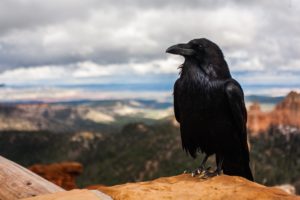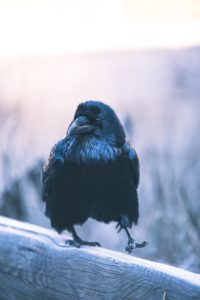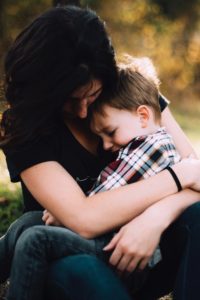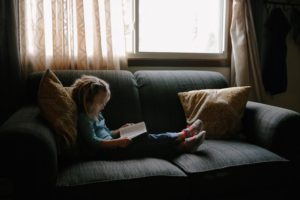We have the great privilege of living close to ravens. These intelligent and entertaining birds make the area off our deck part of their daily rounds, because that’s where we fling the mice caught in mousetraps in the kitchen cupboards, as well as the occasional food rubbish. They’re wary birds. Any flicker of movement in a window sends them aloft, no matter how tempting the morsel on the ground. They make a variety of sounds, but can also be as quiet as a shadow as they wheel over the house, circling and examining the grassy slope below the deck.
This year a pair nested nearby and raised at least one fledgling successfully. Both parents feed the nestlings. A few weeks ago, some instinctive wisdom told the raven parents it was time to stop feeding the fledglings and all hell broke loose in the neighborhood.
The first we knew of it was a plaintive croaking cry, vaguely like a canine yap. We heard it over and over again, clearly coming from something on the wing. It began down over the river and moved up the hill to the house and then I could see the birds. The fledgling was pudgy and puffy, the way all young birds are at the adolescent stage. It looked a little bigger than the adult birds, but not nearly as sleek and not as skilled a flier. The adults flew around it in what looked like a mixture of distress and encouragement, and the youngster complained. And complained. And complained. For hours. Then for days. From first light until sunset it went on.
We watched the parent birds, looking more harried by the day, try to go about their usual rounds up and down the road for roadkill, over our place, over the river and pond, followed everywhere by their noisy, clumsy, demanding offspring, who certainly had the ability and strength to feed himself, if not the desire. At rest, the youngster would gape pathetically, begging each parent in turn for a regurgitated mouthful. Repeatedly, the parents turned away, flew away, dogged and determined.
Ravens are great generalists in terms of their diet. I’m sure the fledgling watched his parents eat carrion, fish, frogs, small reptiles and mammals, insects and plant matter. What we were witnessing was not starvation due to lack of available food, or lack of parenting. What played out before us was nothing more or less than adolescent outrage and parenting far superior to anything I ever achieved.
Both my partner and I are parents and worked for years with parents and children. We watched the ravens with a mixture of amusement, empathy and irritation. “Go find your own dead thing,” my partner muttered, imagining the parent birds’ conversation with the importuning fledgling and making me laugh.
When my two sons chose to leave the little mountain town where we lived and finish out their high school years with their dad in the city, I knew it was the right thing for them to do. It was sooner than I had anticipated, true, but we all recognized they had outgrown the school, the town and me. We were no longer living in harmony.
When I found myself alone, I grieved for a long time. I also sold the house and started shaping a life for myself with the good feeling of a difficult job done to the very best of my ability. I’d given all I could and it was time for them to fly and find their own lives. In the space where they had been for fifteen years I could build new freedom and possibility.
Except they were nearly always in my thoughts. We had long phone conversations. I fretted because I couldn’t interact with them face-to-face and I knew many things were happening in their lives they weren’t telling me about. They did tell me of jobs, roommates, broken-down cars, financial difficulties, bars, music, both new and old friends, and romantic entanglements. They called when they were broken-hearted, scared, confused or just pissed off. Frequently, by the time I got off the phone, I was in tears and spent the rest of the day upset, or lay sleepless wondering what I could do. What I should do. What I should have done as a parent that I didn’t do that might have avoided the current crisis.
I discovered parenting adults is extraordinarily stressful and difficult, with none of the sweet pay-offs I had when we were a family living together. I didn’t see them playing and laughing anymore. I couldn’t touch them or hold them. We couldn’t hang out quietly together. I couldn’t cook for them or watch their faces and bodies mature, marveling at these two people their father and I created.
I’ve recognized in the years between their leaving me and now I wasn’t the excellent parent I thought I was. I was, in fact, merely adequate. I made a lot of mistakes. I was in many ways ill-equipped to parent. Single parenting is an almost impossibly hard road.
I talk to other mothers of adults. Some talk at length about their kids — how proud they are of them, how close they are to them, how successful their kids are. Those parents need no questioning or encouragement. Their conversation is full of their kids all the time, without prompting, and sometimes it’s hard to tell whether the offspring in question is ten or thirty.
Other women, though, acknowledge kids, grandkids and great grandkids, but are not nearly so forthcoming. I’m of that tribe now. Given a sympathetic listener and a relationship of trust, these women tell stories of various addictions, mental illness, toxic relationships, unplanned grandchildren and great-grandchildren, financial struggles, pain, anger, grief and guilt. We find ourselves raising grandchildren and great-grandchildren. We co-sign for loans we can’t afford to pay off. We wonder what we did, or said, or didn’t do or didn’t say that resulted in our kids’ addictions, struggles and unhappiness.
The love that was once the center of our lives and priorities, the strongest, purest feeling we’ve ever had, gradually becomes bewildered and confused. We look everywhere for the children of our memories, but they’re gone. Now, in front of us, are adults. From adults we want responsibility, appropriate boundaries and reciprocity, but our adult children want the unobstructed flow of our nurturing, support and unconditional love to continue, just as it did when they were children.
I didn’t think it would be like this, and neither did my friends.
My thoughts and feelings about my experience as a parent are so tangled I can’t see anything very clearly. Perhaps that’s why I was so taken with the ravens. The animal kingdom has a kind of brutal simplicity with regard to parenting, an instinctive wisdom without concern for what anyone else thinks or cultural and societal norms. The raven parents knew what to do and they did it and endured a few days of discomfort.
Does that mother bird now worry about whether the young adult is happy or not?
Sigh. Probably not.
I notice I never even consider blaming my parents for my happiness or unhappiness. Why, then, do I persist in blaming myself for my adult sons’ choices? Why do I think it’s any of my business at all?
Because I love them.
And so?
And so I want them to be well, and happy, and have good lives.
There are deeper truths, though. I want to be able to think of myself as a great parent. The proof? My adult kids have happy, healthy lives. See how great I was? I also want them to be happy so I don’t have the discomfort of knowing they’re unhappy. How’s that for a piece of maternal selfishness?
So, what, exactly, does a happy, healthy life look like? Is it a life we can boast about in company to illustrate the competence of our parenting? Is it the life “everyone” approves of? Is it the life I approve of? Why do I think I know what a happy, healthy life is for anyone except myself? Most important of all, why did I think I had the power to determine the kind of lives my kids would have?
As parents, we have a lot of power, at least in the beginning. But our power is mixed up with other factors which are not in our control, like genetics, culture, geography and politics. If we judge our parenting effectiveness by the perfect happiness of our adult children, we’re all monumental failures. Life is not one unbroken experience of unadulterated happiness for anyone. Unblemished happiness is, in any case, a lazy, childish goal. What does it mean? Something different to everyone, probably.
What about competence? Yes. I want my kids to be competent. I want them to be able to learn. I want them to have the power to make their own choices and the strength to deal with the consequences. I want them to know how to self-care and love others. I want them to be compassionate, respectful and responsible.
I want those things for them, but I also want them for me so I can feel I parented well and gave them the kind of start every child deserves.
Parenting is an odd business. We enter into years of chaos and hard work and watch our children grow up, never realizing we’re growing up, in many ways, alongside them.
As parents, is it about us, or is about our kids?
I suppose the honest answer is it’s about both, although it feels shameful to admit that out loud.
On the other hand, maybe that’s exactly the way it’s supposed to be. Who knows?
Ravens are solitary. We still have a couple in the neighborhood. I wonder if the youngster has left to find new territory. In time, he may find a mate and raise his own fledglings. He may be killed by a car, a gun, or a predator. He’s on his own in the big world to live his life, however that is, and die his death, however that is. Will the parent birds know? If they know, will they care? Would their knowing or caring assist the young bird in any way, or have they given everything needed already, including forcing the adolescent to begin feeding himself?
I don’t have answers. Nobody I’ve spoken to has answers, but we’re all asking these questions.
I wonder what the ravens would say.
I’m off to find my own healthy and happy afternoon and give my concerns about everyone else a rest.
All content on this site ©2018
Jennifer Rose
except where otherwise noted
© 2018 – 2022, Jenny Rose. All rights reserved.





Oh Jenny, you’ve done it again… You’ve revealed the pain I seek to hide. I’ve been estranged with my first born for almost 8 years and it’s been torture for me. I’ve questioned every decision I made with him growing up. Was I too strong an influence, did I allow him to make his own choices, did I guide him in the right direction for success, did I show him how to protect himself? All of these and a million other questions, always assuming the blame for his bad decisions. My kids were my world and I always viewed them as my greatest accomplishment, raising loving, kind and compassionate children who were respectful and strong. We were a close and loving family. We enjoyed each other and respected each other, until my son married a narcissist. She fooled us for a year or two. Maybe we didn’t want to see…. it went from her controlling everything HE did to her trying to control everything WE did! Coming from my background, that did not end well for her. I firmly put her in her place, denied her entitled requests and she started making my son deal with me. Long story short, they made lifestyle decisions that I couldn’t accept or agree with and we pulled away. Lying in our family was a huge deal and he lied to us repeatedly over the years, so we didn’t see what was going on. Our daughter, who was always very close to her brother tried to speak to him as well, only to have him close down. My loving, kind, respectful son was no more. He had lived with her long enough that her behavior became his behavior, manipulating people to get what they wanted and denying the behavior when they were confronted. She never knew him growing up, yet she completely re-wrote his childhood ! My daughter once told me ” you gave us both the best foundation, Mom. If he chooses to forget that, that’s on him!” I can’t help but feel that somehow, some way, it’s on me…. I fear for my grandchildren, being raised by the two of them. I feel that I have failed in the very worst way. The man wearing my son’s face is a stranger. My son is gone….. it has to be something I failed to do.
Thank you for sharing your pain so openly and honestly, Dawn. You are not alone. I have discovered in the last weeks many mothers who live with this kind of hidden wound. We all go on with our lives, of course, but we bleed, invisibly, silently, and we try to hide the stains of our bleeding out of shame, guilt and loyalty. I suppose that’s why I’m poking at it with this post. I want to think about it clearly, and try to understand where my power is and where healthy boundaries might be. I was no wiser when I finished writing this post than when I started, but I did feel better for having expressed my confusion and questions. What I cling to, and there’s plenty of room for you to cling to the spar with me, is that it’s all working out to some purpose and pattern much greater than I can understand. What if my kids are okay and I was and am okay, and the pain is just the righteous pain of love? After all, I don’t want to pull either of my sons off their path, wherever it takes them. I haven’t the right, or the wisdom, and I haven’t counted it as an act of support when others have tried to pull me of MY path. I just thought nothing could ever tear us apart and break our connection. I trusted our love for one another above all things. Feeling that might have been a mistake reshapes my whole reality, and I don’t know how to manage the pain of it. It turns out nobody has a magic bullet for that, at least not anyone I’ve talked to! Still, I refuse to believe that our love for our children is ever wasted or without value.
Thank you, Jenny, for your frank comments above, on the central who-ness of how I have lived my life for fifty years as parent.
For me, the major goal (so far, so good) of being ‘happy as a parent’ is to do all one can to assist in averting suicide by any family or close member of one’s tribe. Our mortality is rarely discussed and why discuss it? But ‘to be or not to be’ is truly the existential issue for humans and it touches all of us regardless of whether or not each one of us has the capacity to comprehend how very social we are, down to our turned-on and turned- off genes, as a primate who dominates Earth in the Epoch Anthropocene.
As parents, it is ‘natural’ to be neurotic and loathe passing our bag of self-loathings onto the next generation. But escape to a better path is not guaranteed because, as modern humans, life always seems a game of mayhem versus serenity psychologically and societally (meaning, for all of us). Happiness is perhaps merely a habit of perspective that some of us have the capacity to invent and maintain. It is a good thing, surely, and contagious and also scary to some who feel they can never develop such a habit of perspective. Thinking of others is also a good thing if the effort is to comprehend how harshly life’s trials are meted out so unevenly and how democratic is truly is that some are fortunate and others not. There is no room for judgement whatsoever. The fortunate ones are much like the ravens—ravished by those trials but persistent in the pursuit of harmony. Ah, harmony! The focus and drive to do what is needed in the moment to be balanced and graceful in the art of being alive! All of us, young and old, together, we struggle alone…
Thank you, Sidney, for sharing your thoughts and experience. Mothering is a terrible and beautiful endeavor.
Ahhh Jenny, once again you’ve hit me right where I’m hurting. I so wish we lived closer so that we could get together and chat about these things.
My husband took his own life in January 2005 so I’ve finished the raising of my 6 kids alone (albeit with some help from a couple partners I was involved with between then and now).
I am just now entering empty next territory. [Although my nest will never be completely empty because my oldest daughter (who has Down Syndrome) and I will be long-term roomies.] ????
My youngest 3 daughters all moved out within the last month or so. Laura and I are downsizing and moving into an apartment in September.
Some days I can’t take all the feels and the thoughts endlessly running through my brain. My 2 boys are both facing difficult struggles right now. Everything you described here is on replay as I question myself and my parenting, both over the years and currently.
Thanks so much for putting into words what so many of us are struggling with. ❤️
The hardest thing about this blog is the many women I’ve connected to — long distance! I, too, wish we could sit somewhere face-to-face and just talk! You sound like a woman of extraordinary strength and courage walking on a hard road. I salute you. What a transition you’re in right now! So much about parenting feels like living on the edge of chaos, either our own or theirs, or some edgy combination. In some ways, the experience of labor and birth is like an initiation. As parents, we continue to be tossed and buffeted from one feeling to the next by a power far greater than we are. It’s exhausting, exhilarating, heartbreaking and terrifying by turns. The dust settles from one transition or upheaval, and then another begins. Thanks so much for reading and commenting. It’s good to know I’m not the only one who struggles with being a parent. Hang on to your courage and sense of humor. Greatest good for you and your children!